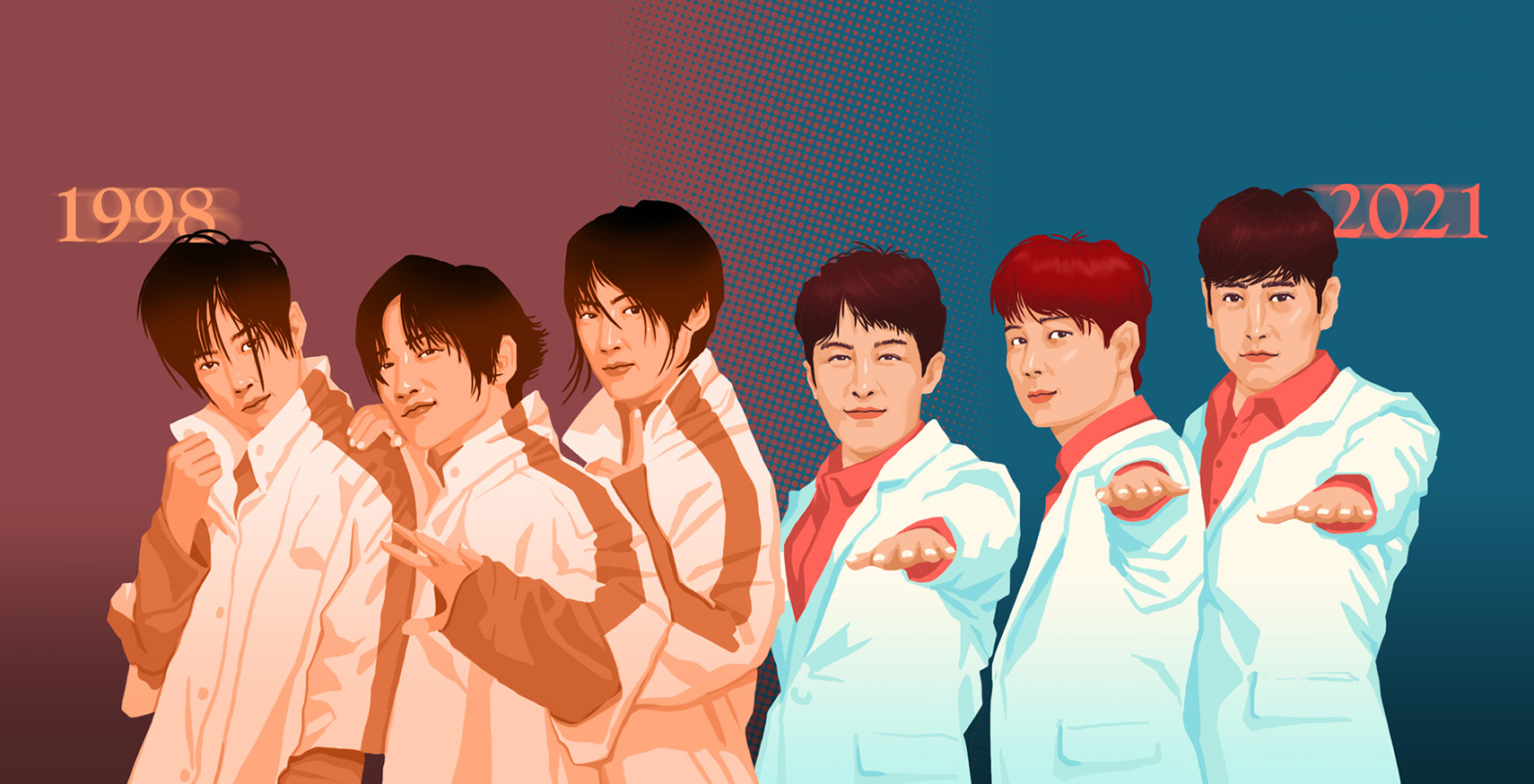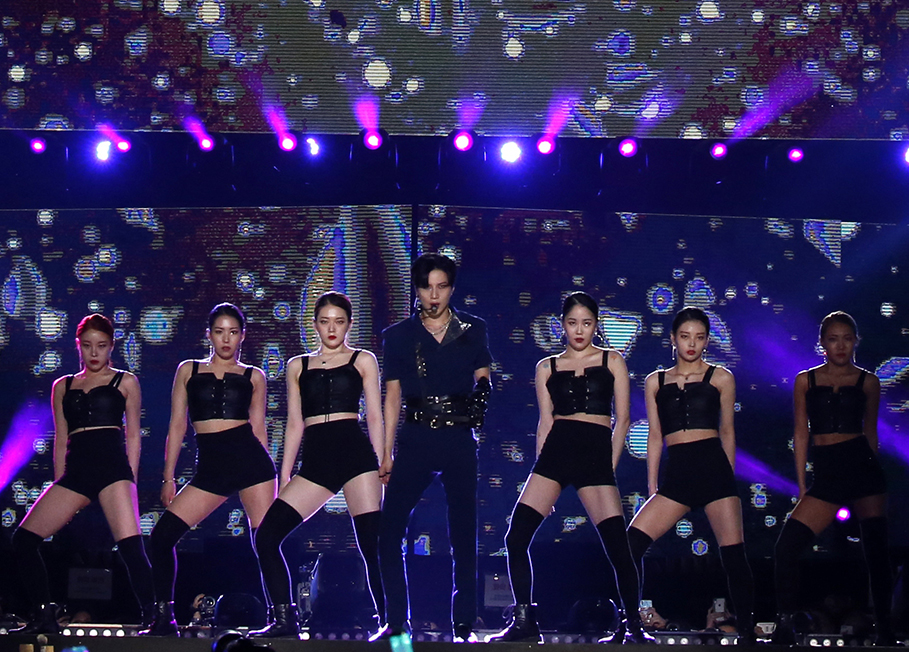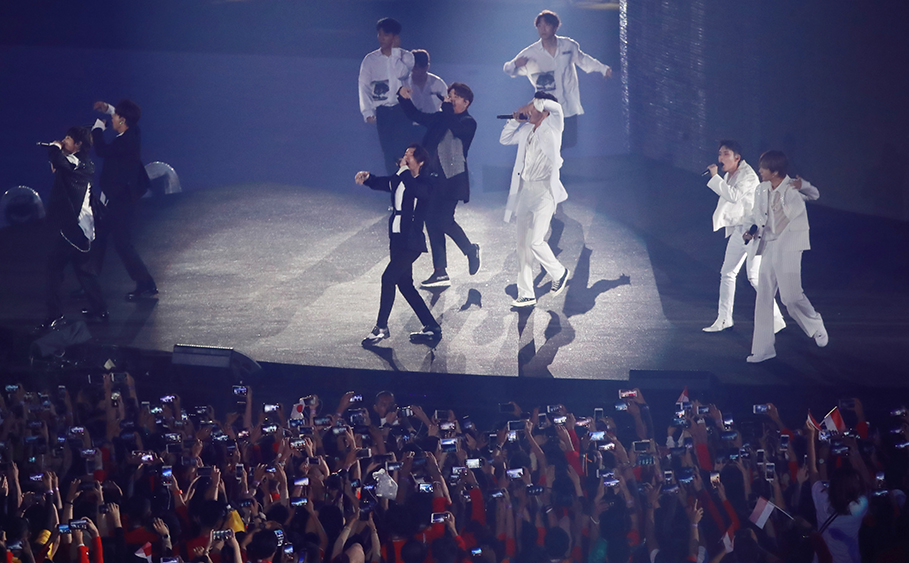April 2021

April 2021
Over the last two decades, K-pop has achieved sweeping success. Based on overwhelming mass appeal, K-pop acts have come to dominate segments of popular music, and now the entire industry. Idol dance music has swiftly risen to the mainstream, edging aside genres that were once more prevalent like pop ballads, rock, and folk. Emerging in 2003, the 2nd generation of idol groups — including TVXQ, Super Junior and Big Bang — have sustained their superstardom, leading critics to take back their words of transpiration dates of idol group careers. More recently, Sunmi (Wonder Girls), Taeyeon (Girls’ Generation), Hyuna (4Minute), Bae Suzy (Miss A), and IU (typically not an idol but comparable in status) have remained popular more than a decade since debuting, invalidating the assumption that idols are short-lived.
Written by
Lim Jinmo,
pop columnist
Illustrated by
JB

Early idol groups such as H.O.T., Sechs Kies, and the girl group SES broke up within six years. Needless to say, artists’ staying power largely depends on the ability to establish solid brand awareness. Early success is critical here. If a group can’t get noticed within several years of their debut, they typically have to break up or halt their activities, putting an end to hopes of a long career.
But Korean idols in the first and second generations scored major successes in the global market both in terms of music sales and concert tickets, solidifying their position and paving the way for long-lasting careers. K-pop’s global influence has given idols longevity. One of the best-known long-lasting idol groups is Shinhwa, which debuted in 1998, making it part of the first generation of idols. It was Shinhwa that made it normal for older idols to stay in the game. Through its entire run, Shinhwa has never replaced a single member.
TVXQ, the epitome of second-gen idol groups, is an unusual example of a group still around after 18 years, albeit with reduced group members. TVXQ has been around for 18 years, Super Junior 16, and Shinee 13. All of them belong to SM Entertainment, under chief producer Lee Soo-man. Industry analysts say that Super Junior, regarded as a Hallyu pioneer, has thrived for so long because all its members put the group first. That testifies to the members’ and label’s commitment to keeping the group in business, though some members have parted ways or done individual projects.
 Taemin from Shinee performs his single alongside
Taemin from Shinee performs his single alongside
a troupe of back dancers. © YonhapNews
 Super Junior consists of many members, each of whom flaunt distinct charms of their own. © YonhapNews
Super Junior consists of many members, each of whom flaunt distinct charms of their own. © YonhapNews
Leeteuk, leader of the group, offered the following thoughts when the group reached its 15th anniversary in 2020. “It’s amazing to think we’re still around 15 years later! We just grit our teeth and held on, and here we are today.” It’s remarkable that such a large group (nine members, down from the original 13) has stayed active for 16 years now. On their 15th anniversary, they released their tenth full-length album.
Some think that the secret to Super Junior’s long career is permitting its members to partake in solo projects in addition to group projects, in contrast to earlier idol groups. However, the precise correlation between, or impact that individual and (smaller) unit-based activities have on group unity, is still in dispute.
Another key to a long career is a reliable fan base. On social media, both the label’s official and members’ personal accounts often send regular updates, forming a close bond and building brand awareness over great distances. That in turn reinforces the members’ loyalty to the group, spawning a positive feedback loop. There’s no denying that TVXQ, which has now been around for 18 years, owes its strength to Cassiopeia, its fan club of 800,000 members.
K-pop is now shaking off
generational shackles through idol groups
with long-lasting careers.

In recent years, social media has been transforming the musical landscape. Significantly, YouTube has been alerting the current generation to past acts, such as Brave Girls, a group that debuted back in 2011, between the second and third generations of K-pop. The group regained popularity when its song “Rollin” recently came back into rotation, years after they performed the song to much acclaim during a morale-boosting visit to a military base. Since such “blasts from the past” are now a common occurrence, they’re expected to help idol groups stay together even longer. The most critical criterion for a long-running career, however, is good music. Among other members of girl groups, boy groups Shinee and Big Bang are living proof of that eternal truth. Sunmi, who began her career with the Wonder Girls, shows that personality and talent are the foundation of a long-lasting career. Since going solo following the group’s successful run, Sunmi has released a number of songs that have gained mass appeal, beginning with “Gashina” in 2017 and continuing with “Heroine,” “Siren” and most recently, “Tail.” Critics praise her songs for befitting the timely atmosphere and tastes of the time. The impetus behind her success during her 14-year-career is her vocal finesse. The same goes for IU, a solo artist, who rose to stardom with the song “Good Day” in 2010. For 13 years now, IU has put out one strong song after another, demonstrating her bottomless capacity to experiment and take on new challenges. Her recently released songs “Blueming” and “Fight” have brought fresh accolades for her musical evolution. She’s also a rare example of a younger artist whose name is familiar to older Koreans.
 IU (Lee Ji-eun) is capable of performing and songwriting in myriad genres and styles.
IU (Lee Ji-eun) is capable of performing and songwriting in myriad genres and styles.
© YonhapNews

K-pop has labored under the stereotype that idol dance groups have a short shelf life due to how much their popularity hinges on fleeting, youthful appearances. That stereotype is held even today by many elderly people. But the idol dance groups in K-pop are undergoing many changes. Artists’ passion and the effeciency of systems that their labels developed account for the emergence of idols with staying power. That’s the power of K-pop: in addition to erasing national boundaries, it’s now shaking off generational shackles by producing idol groups with long-lasting careers.